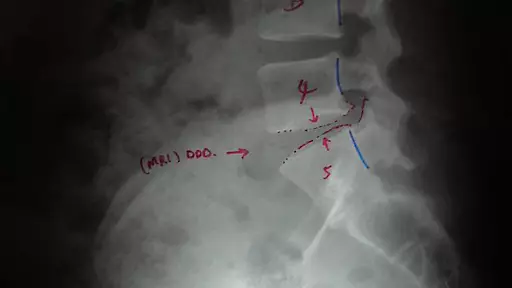
Herniated Disc

One of the most prevalent types of spine problems is a herniated disc, which can trigger excruciating pain and discomfort. Also known as a slipped disc, this condition occurs when the soft inner core of a spinal disc pushes through its tougher outer layer, irritating nearby spinal nerves. Individuals with herniated discs often experience sharp pain, tingling, or weakness in the affected area of the body.
Aging, improper lifting techniques, and injury are common causes. Decompression therapy and chiropractic adjustments offer effective non-surgical solutions for herniated discs.
Decompression therapy involves gentle stretching of the spine using specialized equipment, relieving pressure on the affected disc. This technique promotes nutrient exchange, reduces bulging, and can help disc material retract, alleviating pain and promoting healing.
Chiropractic adjustments, on the other hand, involve precise manual manipulation by a trained chiropractor. By realigning the spine, chiropractic adjustments can ease pressure on the herniated disc, reducing irritation of surrounding nerves. This often leads to reduced pain, improved mobility, and enhanced overall spinal health.
However, if symptoms persist or worsen, surgical options may be considered to alleviate pressure on the affected nerves.
Scoliosis
Scoliosis, characterized by an abnormal curvature of the spine, can be a source of both physical and emotional distress. It usually becomes noticeable during childhood and adolescence but can develop in adulthood as well. Symptoms include uneven shoulder and hip heights, back pain, and spinal deformity. While the exact cause remains elusive in most cases (known as idiopathic scoliosis), congenital factors can also contribute.
Chiropractic treatment options vary depending on the severity of the curvature. Mild cases might only require close observation, while more pronounced curvatures might necessitate bracing or chiropractic treatments.
Chiropractors employ specialized chiropractic treatment techniques to promote spinal flexibility and correct misalignments in the vertebrae. These adjustments not only alleviate pain but also contribute to improved nerve function, helping the body better manage the challenges posed by scoliosis. Chiropractic care offers a non-invasive and holistic approach to managing scoliosis, enhancing the overall well-being of individuals living with this condition.
In severe cases, surgical intervention is considered to correct the curvature and prevent further progression.
Sciatica

Sciatica is a condition that originates from the irritation or compression of the sciatic nerve, which runs from the lower back down to the legs. This compression leads to radiating pain, numbness and tingling along the nerve pathway. Herniated discs and spinal stenosis are common culprits behind sciatica.
Non-surgical treatments for sciatica include decompression therapy and chiropractic adjustments that offer effective relief. Decompression therapy gently stretches the spine, creating space between vertebrae and reducing pressure on the affected nerves. This can alleviate pain and promote healing by encouraging nutrient exchange.
Chiropractic adjustments focus on realigning the spine to relieve nerve impingement. Skilled chiropractors apply precise manipulations to correct misalignments, reducing inflammation and enhancing nerve function. Both treatments are drug-free and holistic, addressing the underlying causes of sciatica. By restoring spinal health, they provide relief, improved mobility, and a non-invasive path to recovery.
When non-invasive approaches fail to provide relief, surgical options like discectomy or laminectomy might be considered to alleviate pressure on the sciatic nerve.
Spinal Degeneration
Spinal degeneration refers to the gradual deterioration of the spine’s structural components over time. As we age, the wear and tear on our spinal discs, joints, and bones can lead to changes that impact mobility, comfort, and overall spinal health. The process of spinal degeneration unfolds in three distinct phases: Phase 1, Phase 2, and Phase 3.
In Phase 1, if left untreated or uncorrected for a span of 3 to 5 years, the intervertebral disc begins to thin, setting the stage for early symptoms of subluxation. These symptoms encompass sensations of stiffness, tightness, tension, aches, fatigue, and occasional headaches. Frequently, these warning signs go unnoticed, or one might attempt quick remedies such as painkillers, ointments, patches, or self-stretching exercises. However, it’s important to recognize that such measures merely offer transient relief without addressing the underlying issues.
As time progresses into Phase 2, after a span of 6 to 10 years without correction, the disc undergoes further thinning, accompanied by the development of bone spurs. During this phase, symptoms intensify, becoming more frequent and impactful. These symptoms can significantly disrupt daily functions, including sleep and work performance.
Upon entering Phase 3, extending beyond 9 to 15 years without intervention, the spinal vertebrae nears a state of fusion. This advanced stage of subluxation presents severe and persistent symptoms, such as enduring pain, persistent numbness and tingling, acid reflux, hives, and weakened immunity. The cumulative impact on your quality of life becomes profound.
It is crucial to comprehend that timely corrective actions during the earlier phases of spinal degeneration can prevent these debilitating consequences and help maintain a high quality of life.
Chiropractic treatments offer valuable support for individuals facing spinal degeneration. This natural and non-invasive approach focuses on improving spinal alignment, mobility, and overall function. Skilled chiropractors utilize gentle adjustments to address misalignments and reduce stress on the spine.
By realigning the vertebrae, chiropractic care helps alleviate pain, stiffness, and discomfort associated with spinal degeneration. It also promotes optimal nerve function, which is essential for maintaining overall health. Chiropractic adjustments not only target symptom relief but also aim to slow down the progression of degeneration by enhancing the body’s innate ability to heal itself.
Through regular chiropractic sessions, individuals can experience improved quality of life, enhanced mobility, and reduced reliance on pain medications. Chiropractic care offers a holistic and proactive approach to managing spinal degeneration, helping individuals regain comfort and maintain their well-being.
Prioritize Your Spinal Health with Chiropractic First
In the intricate tapestry of spinal health, understanding the symptoms, causes, and treatments of various types of spine problems becomes paramount. Our spine is a vital support system, essential for mobility, posture, and protecting the nervous system. Any spine injury triggers a domino effect across our lives.
From basic movements to maintaining posture, the spine is pivotal. Injury impedes simple tasks, curbing independence and comfort.
Poor spinal health affects mobility and sleep quality, hindering day-to-day activities and restful nights, and impacting energy levels. Work performance also suffers due to pain stemming from poor spinal health, impacting productivity and mood.
Prioritizing spine health through chiropractic care ensures an active, pain-free life. The spine’s role is foundational, warranting proactive attention.

Regular spine checks are crucial. Early detection prevents pain from becoming severe, just like addressing tooth decay before nerve involvement.
Similar to tooth decay, the initial indications of subluxation might not present obvious symptoms. The subtle warning signs may remain unnoticed as there is no obvious pain or symptoms. When the degeneration progresses to the nerves, and pain is finally felt by the body, the condition would have already taken place in months or even years. Another example are heart attacks, where early blockages within heart vessels often manifest without discernible symptoms. The absence of apparent signs in early stages (30% – 50% blockage) contrasts sharply with the critical stage at which pain or urgent symptoms arise – when the blockage has already advanced to 90% or beyond.
Just as early dental care prevents extensive decay, proactive attention to subluxation through chiropractic care can ward off debilitating consequences. Understanding these parallels underscores the importance of proactive health management, where early intervention can be the difference between minor discomfort and significant health challenges.
By adopting preventive measures such as maintaining a healthy lifestyle, practicing proper posture, and seeking professional chiropractic advice, we can safeguard our spinal health. Remember, a strong and healthy spine sets the foundation for a life of comfort and vitality.
Concluding Words
Chiropractic therapy is said to be a preference among people who have persistent bodily aches since it is non-invasive, calming, and rapid. You may bid your physical discomforts farewell when you see our highly trained and qualified chiropractors.
Our spine and nerve specialists can treat all these issues, which include headaches, neck discomfort, muscular pain, and lower back pain. We focus on detecting the root of the problem, structural corrections and possibly permanently reversing the problem.
Schedule An Appointment
Our highly trained chiropractic practitioners specialize in helping people from all walks of life improve their spinal health. Visit Chiropractic First for a thorough assessment from one of our experienced chiropractors. Discover a path to better health and well-being by booking an appointment with us today!



